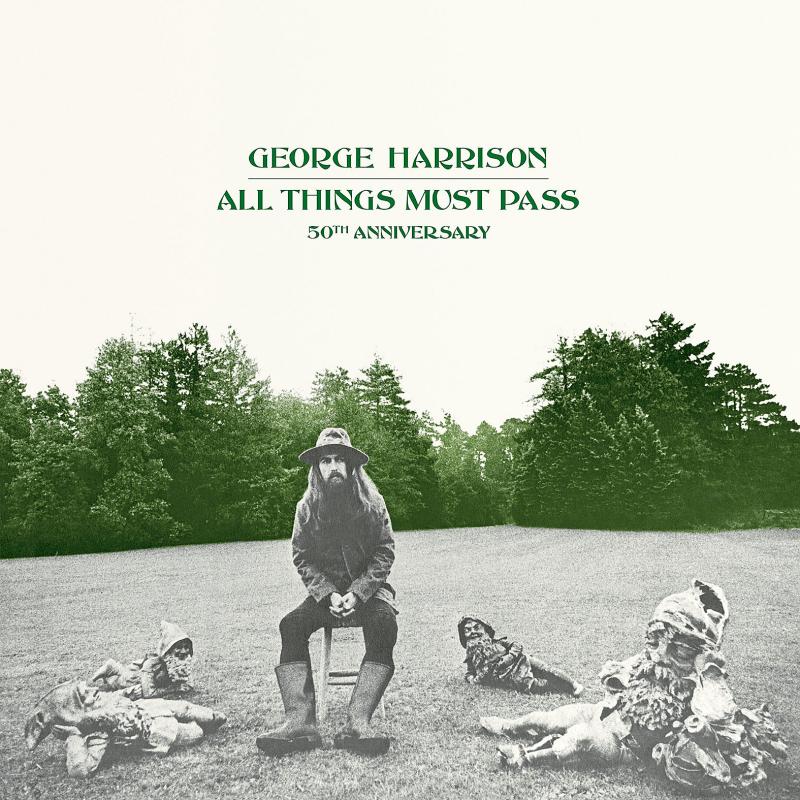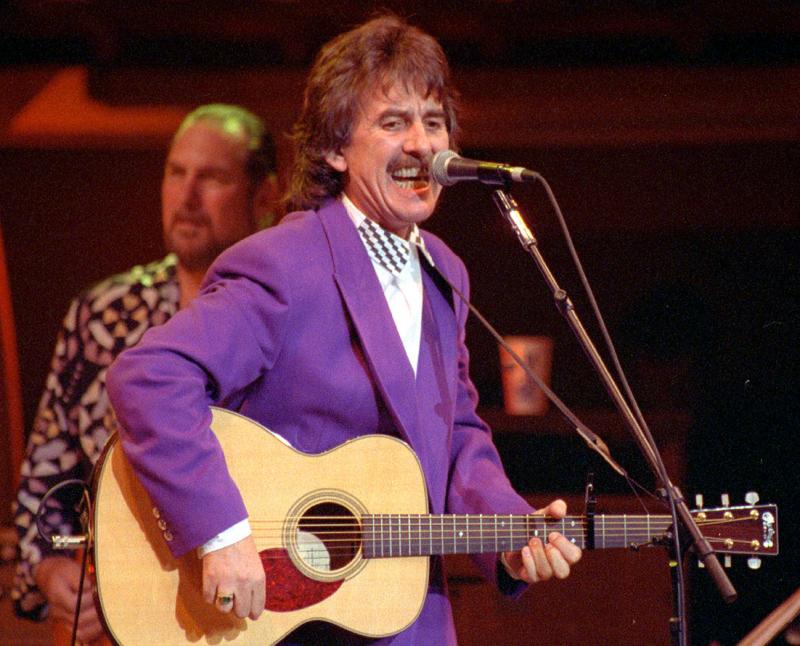George Harrison’s landmark album All Things Must Pass is celebrating its belated 50th anniversary and the former Beatles’ son thinks a new remixed collection might make the perfect post-pandemic soundtrack.
“I think that the message of this record is more ready to be received now than it was when it first came out,” said Dhani Harrison. “The message is clearer and now it’s sonically clearer. This is a really important bit of music.”
The original collection was audacious for its time — the first triple studio album in rock history, a virtual flurry of vinyl. The anniversary editions out this week make that look quaint, containing eight LPs (or five CDs) plus a Blu-ray audio disc, with the remixed album, demos, outtakes and jams.

Photo: AP
There are reprinted archival notes, track annotations, photos and memorabilia. The most expensive edition comes in its own wooden crate, complete with figurines of the famous garden gnomes featured on the album cover. But first is the music, which Rolling Stone lists among the 500 greatest albums of all time.
“We’re not trying to make it sound modern,” said triple Grammy Award-winning engineer Paul Hicks. “I’m not trying to put any sort of stamp on it. We are very respectful to the mixes that were there and follow them as much as possible.”
The skeleton of All Things Must Pass was recorded over two days in late May 1970. On May 26, Harrison record 15 songs backed by Ringo Starr and his longtime friend, bassist Klaus Voormann. The next day, he played an additional 15 songs for co-producer Phil Spector on just an acoustic guitar.

Photo: AP
The original 23-track album — complete with hits Isn’t It a Pity, What Is Life and My Sweet Lord — has been remixed for the anniversary editions from Capitol/UMe and are now augmented with 47 demos and outtakes, 42 of them previously unreleased.
The 1970 session tapes produced 25 hours of music, including several songs that didn’t make the album like Cosmic Empire, Going Down To Golders Green, Dehra Dun, Sour Milk Sea and Mother Divine.
ANNIVERSARY EDITION
Dhani Harrison and Hicks started work on the anniversary editions five years ago, re-digitizing and listening to every song and every take made during the sessions. It was an ever deeper dive than the 30th and 40th anniversary reissues. Hicks calls the new work “forensic.”
They emerged from the vault with some 110 different songs and Harrison and his team had to decide how to present what he’d found. He recalled once listening to a Beach Boys box set that had 10 versions of every song and didn’t want to go that route.
Instead, he wanted to bring the listener into the recording process to hear how the songs had evolved. “What we were looking for was the ones that really stood out and that really screamed something new,” said Harrison.
A very human George Harrison — who died at age 58 in 2001 — can also be heard in the mix. He’s captured asking for orange juice — while playing a very cool version of Get Back. His Going Down to Golders Green is Harrison doing his very best Elvis impression, a real treat. There’s also Harrison’s recording of It’s Johnny’s Birthday, a gift to mark John Lennon’s 30th birthday.
The demos reveal the origin of a very rootsy Woman Don’t You Cry For Me, which would become the opening track of his 1976 album, Thirty Three & 1/3. And during the 14th take of Isn’t It a Pity, a fed-up artist goes off-script to instead sing: “Isn’t it a pain/Why we do so many takes?”
Harrison and Hicks have dubbed Disc 5, which contains session outtakes and jams, the “party disc.”
“We wanted to show that the guys were having fun,” said Hicks. “It’s emotionally a very heavy album. It touches on a lot of deep subjects. So we really wanted to show a lighter side to some of the content.”
Harrison collected quite a roster of musicians to help him on All Things Must Pass, including Eric Clapton, Bob Dylan, Ringo Starr, Billy Preston, Delaney and Bonnie Bramlett, Pete Drake and even a young Phil Collins (whose bongo work never made the album).
“It was a pretty mean squad of people that he recruited, you know what I mean? Like, he wasn’t messing around with this record,” said Harrison.
The younger Harrison also investigated stories behind the songs, like the album opener, I’d Have You Any Time. He learned that Clapton struggled at times to play Harrison’s notes. “It was incredible to hear Eric say how hard it was because that’s a guy that doesn’t find playing guitar very hard.”
The All Things Must Pass recording sessions began just six weeks after the April 1970 announcement of The Beatles’ break-up and the younger Harrison notes that his father was going through a lot during that time: In addition to the band’s break-up, he lost his mother and he was also leaving a lover.
“It’s a family time capsule and there’s so much love in it,” said Dhani Harrison. “He was brave to do this when he did it. It’s lightning in a bottle. I don’t think that those conditions come around maybe once in a lifetime for an artist.”

Cheng Ching-hsiang (鄭青祥) turned a small triangle of concrete jammed between two old shops into a cool little bar called 9dimension. In front of the shop, a steampunk-like structure was welded by himself to serve as a booth where he prepares cocktails. “Yancheng used to be just old people,” he says, “but now young people are coming and creating the New Yancheng.” Around the corner, Yu Hsiu-jao (饒毓琇), opened Tiny Cafe. True to its name, it is the size of a cupboard and serves cold-brewed coffee. “Small shops are so special and have personality,” she says, “people come to Yancheng to find such treasures.” She

In July of 1995, a group of local DJs began posting an event flyer around Taipei. It was cheaply photocopied and nearly all in English, with a hand-drawn map on the back and, on the front, a big red hand print alongside one prominent line of text, “Finally… THE PARTY.” The map led to a remote floodplain in Taipei County (now New Taipei City) just across the Tamsui River from Taipei. The organizers got permission from no one. They just drove up in a blue Taiwanese pickup truck, set up a generator, two speakers, two turntables and a mixer. They

The low voter turnout for the referendum on Aug. 23 shows that many Taiwanese are apathetic about nuclear energy, but there are long-term energy stakes involved that the public needs to grasp Taiwan faces an energy trilemma: soaring AI-driven demand, pressure to cut carbon and reliance on fragile fuel imports. But the nuclear referendum on Aug. 23 showed how little this registered with voters, many of whom neither see the long game nor grasp the stakes. Volunteer referendum worker Vivian Chen (陳薇安) put it bluntly: “I’ve seen many people asking what they’re voting for when they arrive to vote. They cast their vote without even doing any research.” Imagine Taiwanese voters invited to a poker table. The bet looked simple — yes or no — yet most never showed. More than two-thirds of those

Former Chinese Nationalist Party (KMT) chairwoman Hung Hsiu-chu’s (洪秀柱) attendance at the Chinese Communist Party’s (CPP) “Chinese People’s War of Resistance Against Japanese Aggression and the World Anti-Fascist War” parade in Beijing is infuriating, embarrassing and insulting to nearly everyone in Taiwan, and Taiwan’s friends and allies. She is also ripping off bandages and pouring salt into old wounds. In the process she managed to tie both the KMT and the Democratic Progressive Party (DPP) into uncomfortable knots. The KMT continues to honor their heroic fighters, who defended China against the invading Japanese Empire, which inflicted unimaginable horrors on the